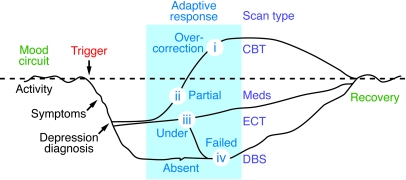Figure 2. Theoretical time course of mood circuit changes during a depressive episode.
Functional neuroimaging abnormalities are viewed as the net effect of a triggering event and subsequent intrinsic adaptive or maladaptive responses, in other words, failure to self-correct. The nature of these compensatory changes is considered critical for understanding clinical symptom heterogeneity and clinical subtypes of MDD, providing a potential future framework for the development of brain-based algorithms for treatment selection based on distinct circuit patterns or brain phenotypes (indicated here as scan types i–iv). By example, scan type i, characterized by maladaptive overcorrection of the circuit, might be optimally treated with CBT. In contrast, failure to initiate or sustain any adaptive response, as defined here by scan type iv, might require ECT or DBS.

